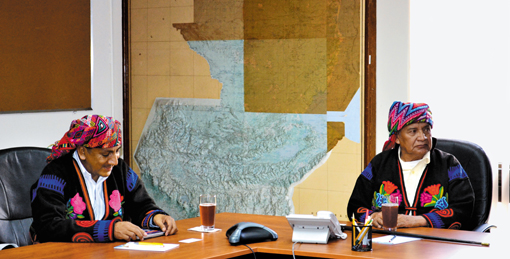Conflicts between Guatemalan Indigenous communities and corporations have raged for decades. One tragic example: in the early 1980s, at least 444 members of Maya-Achi communities protesting construction of the Chixoy Dam on the Rio Negro were killed by government troops (a reparations plan was announced in 2014). Yet since 2013, a group of businesspeople and Indigenous political leaders are seeking to bridge their historic divide through the Mejoremos Guate initiative’s Intercultural Affairs Commission.
Mejoremos Guate (Let’s Make Guatemala Better) was launched in 2011 by the Fundación para el Desarrollo de Guatemala (FUNDESA) and the Comité de Asociaciones Agrícolas, Comerciales, Industriales y Financieras (CACIF) to combat malnutrition, improve education and reduce poverty. In 2012, Alejandro Toledo, Peru’s first Indigenous president, advised the group to collaborate with Indigenous leaders, which inspired them to establish the Intercultural Commission.
The commission brings Indigenous leaders face-to-face with prominent businesspeople for weekly meetings to discuss challenges. Among other projects, the commission’s 14 members—seven business leaders and seven Indigenous leaders—are creating a guideline of best practices to encourage companies to align their policies with the International Labour Organization’s Convention No. 169, which establishes Indigenous peoples’ right to be consulted on projects and laws that affect them.
The leaders were skeptical at first. “We thought that a frank, bona fide dialogue would never be possible with the [private] sector,” says Pedro Bal Cúmes, 56, a commission member from Chimaltenango. But the commission’s achievements have started to make an impact: the leaders secured public funding to improve health and nutrition programs in Sololá and have partnered with companies for Indigenous communities to sell their products.
The commission also seeks to empower Indigenous leaders by supporting their political careers. Private donations channeled through Mejoremos Guate have enabled two members to earn master’s degrees in public administration with a focus on political advocacy. Vivian Dinora Yax Tay de Quemé, one of the beneficiaries, is a native of Quetzaltenango and former vice minister for community support. Yax is now using her work on the commission to combat gender and intra-familial violence. One of Guatemala’s long-standing challenges, she says, is to give Indigenous populations an equal voice in governing the country—something she believes the commission is addressing by providing “an opening for everyone to give their opinion.”
While the commission works to find common ground—and has succeeded in areas such as rural development and business practices—it does not always reach consensus. Jorge Morales Toj—a 42-year-old Maya K’iche leader, human rights lawyer, and former guerrilla—spoke of a particularly divisive argument in March 2013 over Guatemala’s recent history. Business leaders denied that genocide occurred during the conflict, but various Indigenous delegates begged to differ. In this case, the commission agreed to continue to listen to each other’s perspectives. However, Yax notes that the group has made some progress simply by acknowledging the differences in how Guatemalans view development and the use of resources.
There have been detractors of the commission, with claims that the members have been manipulated to benefit Guatemala’s oligarchy. But Morales argues that real change can only come through mutual respect—which will take time. Meanwhile, he says, it is important for business leaders to “recognize the existence and legitimacy of the Indigenous ancestral authorities of these communities, who […] also fight in one way or another to solve community problems.”




